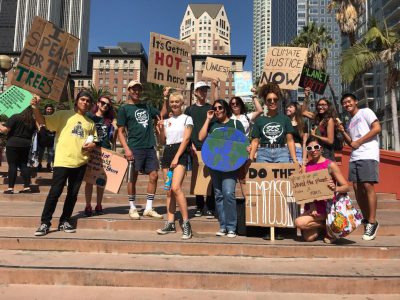By: Viviane Anthony
Last September, millions of people all over the world took to the streets armed with banners and signs decorated with slogans and drawings about a problem that is affecting us all: climate change. The most noticeable face of this movement was Greta Thunberg, a 16-year-old Swedish activist whose impassioned address at the United Nations lit up social media. Thunberg was joined by millions of students about her age, protesting from all corners of the world.
Some of those students are right here at Fullerton College. Advised by Professor Aline Gregorio, Students for Equitable Sustainability (SES) started three years ago with Audrey Waight, a Fullerton College student and environment enthusiast. Equitable sustainability from the group name means sustainability for all.
“Equity allows everyone fair access to the same necessities and human rights, not based on any sort of societal construct,” explains Emily Dewell, the secretary of the group. “For me it shows what we’re all about: fighting for those who are facing social or environmental injustices.” Most members of the group are in their late teens and early twenties, which mirrors the involvement of the younger generation in the climate issue.
“It’s definitely a youth movement. We are recognizing the position that we’re in and how it’s going to affect us and our children and the rest of humanity,” says Chad Becker, the president of the group. The SES group participated in the climate strike that took place in Los Angeles last September.
“It was very empowering,” says Dewell. She explains that they met thousands of people that shared the same mindset as them. They marched down to City Hall where Los Angeles Mayor Eric Garcetti came out. “It was really moving being there. You could literally feel the energy,” says Dewell.
Around the time of the climate strike, 170 news outlets, such as CBS News and The New York Times dedicated a week of coverage to climate change stories and the climate strike.
According to the NASA website, the global temperature has increased 1.9 degrees Fahrenheit since the 1880s, with 2016 recorded as the hottest year yet. Sea levels are also rising about 3.3 millimeters a year.
“There is no time in human history that climate change has been on the forefront of news as it is today, so it was pretty impactful,” explains Becker when asked if they thought the strike made an impact.
On the afternoon of Oct. 10, the SES group met under a tree on the grass of Fullerton College’s quad. They were talking about plans to participate in other climate strikes, and Dewell suggested doing one on Earth Day, April 22, when more people that aren’t as passionate about the climate will be paying attention. 
Beyond attending protests, the SES members spend time organizing planting days or getting rid of invasive plant species in our local area. They also did chalk art in the quad for the climate strike. Some of the art included a big butterfly surrounded by quotes and phrases about climate change like “wake up” or “this is not a drill” and “I’m with Greta.” That’s been a way for them to bring the slogans they saw at the strike back to Fullerton.
Thunberg isn’t the group’s only inspiration. When asked which activist influenced their group they said Ed Winters aka Earthling Ed, a vegan educator and public speaker; the nature poet Henry David Thoreau; Rachel Carson, the writer of “Silent Spring,” an investigation into the damaging effects of pesticides; and the water protectors from Standing Rock, North Dakota.
“People are really fighting for their basic necessity, their main water source, that shouldn’t be a fight that has to happen,” said Jade Dalrymple, another active member of SES.
While the group members are well aware of the activists who came before them, they feel the current moment for climate activists is significant.
“We’re the first generation to know how impactful we are in terms of destroying the environment, and we might be the last generation that has the chance to do something about it,” said Becker
